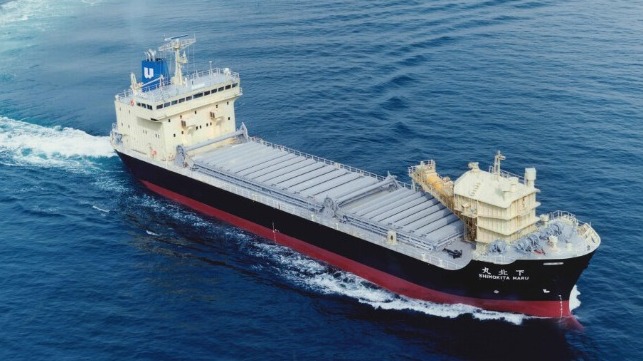
A consortium of Japanese companies is working together to build a new generation hybrid propulsion system, which will be installed on a limestone carrier operating in coastal Japan. The Global Environment Bureau of the Japanese Ministry of the Environment and the Maritime Bureau of the Japanese Ministry of Land, Infrastructure, Transport and Tourism are supporting the project to promote the introduction of advanced technologies that will simultaneously achieve social innovation and decarbonization.
The hybrid propulsion for the vessel, which will be owned by NS United Naiko Kaiun Kaisha, will be composed of Japan’s first gas-only engine combined with a 2,847 kWh lithium-ion battery. The propulsion power and the onboard electric power during sailing will be generated by the gas-only engine developed by Kawasaki Heavy Industries. Natural gas will only be used for power during long-distance and long-duration navigation. The propulsion power and the onboard power while entering, leaving, and berthing in port will be provided from the battery to achieve zero-emission operation.
The companies said CO2 emission will be reduced by nearly a quarter (about 30 percent at normal load operation) from introducing the propulsion system when compared to conventional vessels of the same type. Using LNG as its only fuel, the vessel’s exhaust gas will contain almost no SOx, and NOx, with overall emissions far below Tier III standards.
Another unique feature in the design of the vessel will be in its LNG fuel tank. They plan to use seven percent nickel steel plate developed by Nippon Steel Corporation for the first time as a marine tank.
Construction for the new vessel will be carried out by Japan’s Tsuneishi Shipbuilding and is scheduled to start the operation in February 2024. It will be 5,560 dwt with a length of 308 feet. Once in service, it will be jointly chartered by Nippon Steel Corporation and Nippon Steel Cement transporting limestone, which is the auxiliary raw material for steelmaking and the main raw material for cement, between Shiriyamisaki and Muroran, Japan. Like NSU’s prior vessels, the new ship will be fitted with a self-unloading system.
The vessel will be a replacement for the Shimokita Maru, built in 1994 with a conventional fuel propulsion system.
SOURCE READ THE FULL ARTICLE
https://www.maritime-executive.com/article/japan-to-build-its-first-hybrid-gas-only-and-battery-propulsion-ship